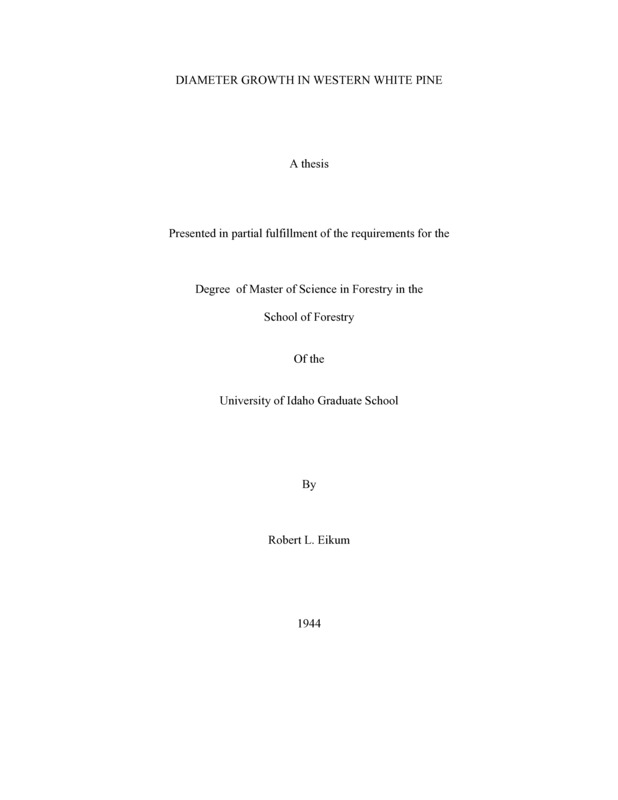PDF PREVIEW
Diameter Growth in Western White Pine Item Info
- Title:
- Diameter Growth in Western White Pine
- Creator:
- Eikum, Robert L.
- Date Created:
- 1944
- Description:
- A study was made of the diameter growth characteristics of western white pine in North Idaho based upon analyses of stumps and increment cores from five recently logged areas. Western white pine was found to grow in diameter inside bark at breast height at surprisingly uniform rates. In dominant trees the rate of diameter growth decreased only slightly with increased age and diameter. For all trees, most of which were old growth, the mean growth rate was very uniform to 24 inches D.B.H and at the rate of one inch in diameter inside bark each seven or eight years. Therefore the rate was slower and at slightly decreasing rate. Above 24 inches diameter increased at the rate of one inch in ten years to one inch in twelve years at diameters between forty and forty-eight inches inside bark. The mean number of rings per inch of radius varied among the different areas from 13.14 to 18.82, the coefficient of variation being in the general range of 33 per cent. The mean number of rings per inch of radius for all trees was 15.11, the standard deviation of the values making up the sample 6.55 and the standard deviation of the mean .21. the median value was 13 rings per inch and the modal value 11 rings per inch. Analyses of growth patterns of individual trees indicated that the growth rate of western white pine was controlled largely by growing conditions and degree of dominance. Senescence apparently was not an important factor. Diameter growth rate was found to decelerate rapidly in co dominant trees from a very heavily stocked even-aged stand in the one-hundred year age class. A few dominants only were able to maintain rapid, uniform rates of diameter increase. Old growth stands of western white pine tend to be uneven-aged due perhaps to light fires or to other factors which might create small openings in the stand. Western pine will become established under partial suppression permitting a diameter growth rate of one inch in radius inside bark in approximately twenty-five years. It is capable of undergoing long periods of relative suppression, up to one hundred years or more on the basis of evidence obtained. It is capable also of responding to favorable growing conditions even at all ages of three hundred years. Periods of rapid growth or of suppression during early life did not appear to influence the later growth of western white pine trees.
- Document Type:
- Thesis
- Library Call Number:
- Spec Col MG5689
- Subjects:
- Flat Creek western white pine pinus monticola growth pattern diameter growth silviculture
- UIEF Unit:
- Flat Creek
- Location:
- UIEF; Flat Creek
- Latitude:
- 46.851013
- Longitude:
- -116.724478
- Department:
- School of Forestry
- Type:
- Text
- Format:
- application/pdf
Source
- Preferred Citation:
- "Diameter Growth in Western White Pine", UIEF Research Exchange, University of Idaho Library Digital Collections, https://www.lib.uidaho.edu/digital/uief/items/uief_0035.html
Rights
- Rights:
- In copyright, educational use permitted.
- Standardized Rights:
- http://rightsstatements.org/vocab/InC-EDU/1.0/

